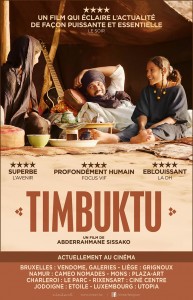This post was written by W.B. Abdullah.
I remember when I first heard the title of the movie, Mooz-lum. It made me cringe, mispronounced by non-Muslims to the point of putting a muzzle on it. I wouldn’t see it–why were my trusted Facebook friends suggesting a movie to me whose name had prejudice written all over it? Shouldn’t they be cringing, too?
But then I found out that it’s the premier work of a Muslim director, Qasim “Q” Basir, so I gave in and watched the trailers. I was seduced, and happily so. The movie is riveting, to say the least.
Personal and autobiographical of the director’s own life, Mooz-lum is basically about a nuclear African-American Muslim family in Michigan on the verge of destruction. The story centers on the evolution of its main character, Tariq a.k.a. “T” (Evan Ross), who is caught between the extremes of two seemingly polar worlds–that of Muslims and non-Muslims. At the heart of the struggle for Tariq is his father’s non-negotiable interpretation of Islam and a slew of bad-examples-of-Muslims that no child should ever meet. Add to the list the ignorance and prejudice that Tariq encounters at the hands of non-Muslims, and you have one severely abused and crippled Muslim child.
To make matters worse, Tariq’s father, Hassan Mahdi (Roger Guenveur Smith), refuses to talk about the problems that his family members face. He never sees any problems—except those threatening his own desires, of course. He sees the world as white and black, and is the archetype of the Muslim who lacks balance and moderation. His inability or unwillingness to bend to the needs of his family ultimately pushes his wife, Safiyah (Nia Long) and his daughter, Taqua (Kimberley Drummond), out the door, leaving Tariq to brave a very strong-willed man bent on molding Tariq into a hafiz caricature of himself. So by the time we as viewers first meet Tariq, he is one hurt, confused, and angry young man who doesn’t want anything to do with Islam.
Enter college life. Hormones, parties, alcohol, gurlzzzz…you know the drill. All the evils of the world nest in college life for a young, confused Muslim, right? Tariq doesn’t know who he is—he is trying to sort out who he wants to be. He’s experimenting. But college does offer a few positives. Tariq meets quite a few strong examples of Muslim women.
There’s Iman (Summer Bishil), the intended of Tariq’s roommate, Hamza (Kunal Sharma). She speaks up in class against bigotry directed towards Muslims. She runs for a student governmental organization. She wears hijab (and stylishly so, I might add). And after 9/11, as the target of an impending hate attack along with Taqua, she refuses to take off her hijab at Taqua’s suggestion, stating firmly, “We will do no such thing.”
Tariq also reconnects with his sister Taqua at college. When we first see Taqua in high school, she is struggling with hijab at a non-Muslim school and doesn’t wear it. At college, she’s spicy, feisty, fashionable, and oh-so-urban-chic. Taqua teaches her brother to dance at a concert and shows the world that yes, Muslims dance, smile, and have fun, too. It’s actually a bittersweet moment. Here is a young man learning to dance for the first time because he was never given the opportunity to do so with his father. A perplexed Tariq asks, “Wait, Mom lets you go to concerts?” Taqua is equally shocked, “What? Dad never gave you that opportunity?”
Which brings me to Tariq’s mother, Safiyah. She is strong-willed, and won’t listen to the whims of any ‘ole man just because. She tells like it is. She walks the middle path, and leaves her husband because she cannot stand his iron-willed curtain. When her son’s well being is threatened at school, she physically fights one of the more terrifying Muslim male characters after he puts his hands on her. She embodies the saying, “Mother knows best.”
But for such a strong example of a Muslim woman, it is actually Safiyah’s character that I take issues with. Upon separating from her husband, Safiyah takes her daughter, but leaves her son because she believes it takes a man to raise a man. But I guess I’ll have to leave that alone—this is an autobiographical movie and that’s a character call. So I’ll say that my only pet peeve with Qasim’s representation of Muslim women was in the physical portrayal of Safiyah, who is always seen with hijab—even in the house among her children. Now you know, hijabis out there, most of us can’t wait to take off our hijabs when we enter our domestic domain. So why wasn’t Nia Long also instructed to do so? Most non-Muslims think we cover our heads all the time, even if we somehow manage to change our hijab color daily…that stereotype did not need to be emphasized. But maybe I can’t blame her…Hassan, Tariq’s father, was always on Safiyah about how inappropriate her dress was—maybe he wanted her to wear her abaya in the house, as well.
But overall, Qasim’s representations of Muslim women are strong. No matter their ethnicity, age, amount of coverage, or marital status, they seem to have it made and know what they want. They are strong and more like the real Muslim women you’d meet everyday. As reviewer Salamishah Tillet put it, these Muslim women “seem to be the most spiritually fulfilled and socially comfortable characters in the film.”
In Mooz-lum, it is ultimately the absence of the Muslim women in his family that leads to Tariq’s spiritual decline. And it’s their re-entry back into his life that gets him back on track. Now how’s that for a statement about the role and status of Muslim women in Islam?
From Iman’s character portrayal of what many of us had to face as hijabis in a post 9/11 world to Safiyah’s embodiment of the struggles of single mothers, the intrinsic cultural value of this movie cannot be denied in offering a rare view into the complexities that many Muslim Americans face. We are, after all, human, too. Was the movie predictable? Yes…but I was surprised a few times. Does it deserve a look-see? Yes! We must demand independent films like this for our voices to be heard…for different voices to be heard.
This movie is important and groundbreaking in its difference alone. It goes without saying that we need more positive, well-rounded, and authentic examples of Muslim women in the film industry. To the director, Qasim, you have done us a service, and we, your strong female Muslim viewers, are anxiously waiting to see what you’ll craft up next.
Mooz-lum is now playing in select cities in the U.S. Why haven’t you seen a commercial? Well, this movie is spreading by word of mouth and the internet. Demand it in your city or check it out at a select city nearby.














